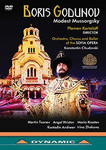|
Back
08/24/2016
Modest Mussorgsky: Boris Godunov
Martin Tsonev (Boris Godunov), Sergei Drobishevski (Prince Shuysky), Angel Hristov (Pimen), Dimitar Stanchev (The Old Man), Grigory Otrepiev (Kostadin Andreev), Irina Zhekova (Xenia), Rumyana Petrova (Xenia’s nurse), Petar Buchkov (Varlaam), Plamen Papazikov (Missail), Mario Krastev (Fyodor), Andrei Shchelkalov (Biser Georgiev), Tsveta Sarambelieva (The Innkeeper), Hrisimir Damyanov (Holy Fool), Orlin Nevenkin (First police officer), Nikolay Petrov (Second police officer), Anton Radev (Mityukha), Stoyan Alexiev (Patriarch job), Orchestra, Chorus and Corps de ballet of the Sofia Opera, Tanya Lazarova (Conductor of the Children’s Choir), Violeta Dimitrova (Chorus Master), Konstantin Chudovski (Conductor), Plamen Kartaloff (Stage Director), Marta Mironska/Stanka Vauda (Costume Designer), Andrei Hajdinjak (Lighting Designer), Stefan Mushatov (Video Director)
Live recording: Plaza of the Alexander Nevsky Cathedral, Sofia, Bulgaria (2014) – 115’
Dynamic #37718 – PCM 2.0 – Format 16:9 – Region 0 – Booklet in Italian and English – Subtitles in Bulgarian, English, Italian, German, French, Russian and Korean (Distributed by Naxos of America)

   
Modest Mussorgsky’s epic drama, Boris Godunov, is just as convoluted in its dizzying revisions and modifications as those found in Verdi’s Don Carlo. Because of the opera’s repeated edits, there’s no definitive staged recipe, thus leaving the task at the sole discretion of the director. Plamen Kartaloff’s amazing production takes on its own degree of historical context by returning 90 years later after its premiere in front of Sofia’s Alexander Nevsky Cathedral while commemorating the 100th and 85th anniversary birth dates of famed singers, Boris Christoff and Nicolai Ghiaurov, respectively.
The impressive outstretched façade of the famed church helps display the front staging within the plaza where the predominance of action takes place. Replete with birch woods and an oversized draped map tapestry of the Russian empire signifying the Tsar’s apartment in Act I (ref: Laurent Pelly’s 2007 Metropolitan Opera production of La Fille du régiment), Kartaloff’s scenic vision proliferates by utilizing flush-to-the-floor metal beams which radiate in spokes and originate from the center doorway thereby acting as a conduit for choral members. Additionally, a similar singular set of tracks is placed parallel to the cathedral’s front entrance that are used to haul onstage a pseudo locomotive which acts as the inn on the Lithuanian border. This creates an unusual but vibrant scene within Act I.
Logistics for the Sofia Opera troupe are extensive, and it’s incredible imagining the synchronization required in this Boris Godunov. Given the immense set spacing and distance from the pit, it is astonishing how singers are relatively well coordinated with Chudovski’s orchestra. Scenery changes seem to melt away in a most unobtrusive way, giving sense to a seamless time scope.
If the might of Mussorgsky’s music isn’t powerful enough to begin with, the principal singers magnify the immensity of the score. No single character shows signs of weakness or intimidation, and the voice projections are exceptional, especially when set against the Orchestra’s virile swells.
Martin Tsonev follows in the footsteps of fellow countryman, Boris Christoff in the title role. There’s nothing to sneeze about as Tsonev is everything Plamen Kartaloff could wish for in this grandiose reconstruction. Though the voice is a shade lighter in darkness when compared to Boris Christoff, there’s an aura of might and energy which insidiously builds towards Boris’ madman state. Martin Tsonev’s repeated browbeating instills fear in any and all of the individuals he encounters.
One of the most intense moments occurs with Sergei Drobishevski’s Prince Shuysky. Drobishevski’s delicately delineated tenor register gives him an opportunity to defend himself against a haranguing delusionary Boris when mulling over images of the dead infant, Dimitri. The prophecy, deemed the final demise for Boris, is unwavering in song by Angel Hristov in the role of Pimen. A sense of final sentimentality for Boris Godunov can be attributed to the innocent, youthful inflections and vocal finery by Mario Krastev as the heir-apparent, Fyodor: the musical vocabulary and nuances are extremely succinct and poignant, exhibiting pathos and physical expression aiding in the templating of appropriate human behavior.
The female contingent limits its principles to Xenia (Irina Zhekova), Xenia’s nurse (Romyana Petrova) and the innkeeper (Tsveta Saramelieva) who all portray their roles in a very appropriate manner. What’s missing, however, is Princess Marina (ref: Act III) even though we witness the very appropriate scheming vicissitudes of Kostadin Andreev’s Grigory Otrepiev along with the drunken antics by Petar Buchkov’s Varlaam and Plamen Papazikov’s Missail. The absence of the entire ‘Polish Castle’ act can hardly be blamed as an inappropriate deletion since the through-plot development makes sense without it. In short, it tightens this Boris Godunov.
The meticulous ornamentation surrounding all characters through costuming by Marta Mironsky and Stanka Vauda is superlative. This helps add to the indelible and inherent Russian grounding of this production.
Plamen Kartaloff was awarded Bulgaria’s prestigious Crystal Lyre Award in the category of “Best Production Team” in 2014. Certainly a privilege and commendation, this accolade is deserved for its historical honoring of Boris Godunov.
We have a capture in our archives: artistically impressive and monumental.
Christie Grimstad
|